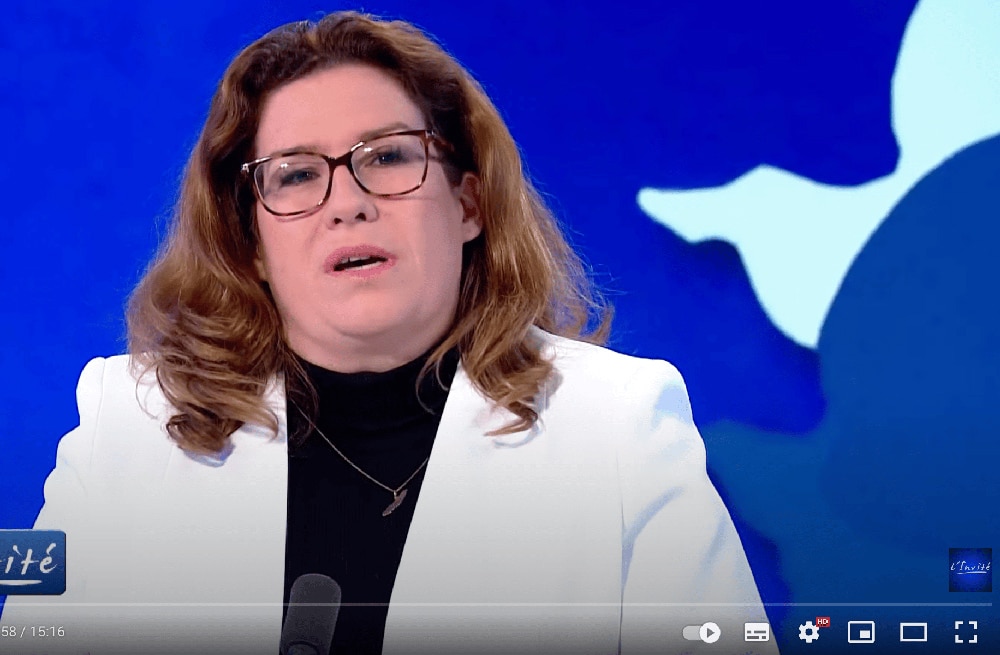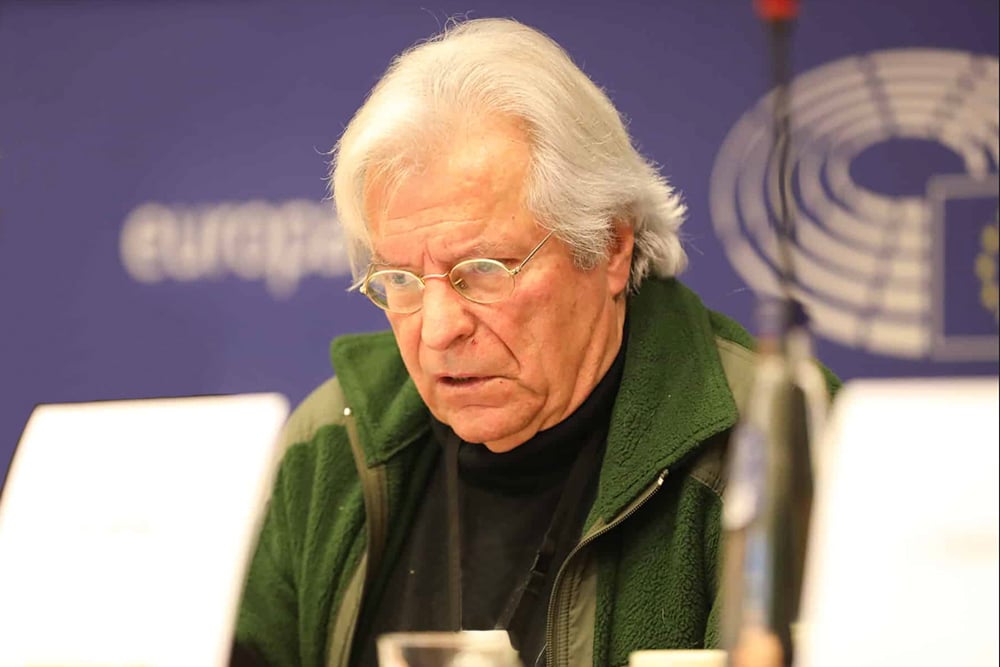In an interview with French magazine Le Figaro on January 30, Sonia Backes, deputy Minister of the Interior for Citizenship, announced that she intends to engage Europe on the issue of “cults” usage of social networks. To combat what she calls “sectarian deviances”, she thinks that “If we want to intervene with regard to social networks, the action to be taken must be at the European level.”
Sonia Backes, new Deputy Minister for Citizenship
Sonia Backes is an interesting character. Coming from the French far remote province of New Caledonia, a former French colony in the Pacific Ocean that still belongs to France, where she made a name for herself by being a rabid anti-independence politician, she has been appointed as State Secretary for citizenship in the French government in July 2022, under the authority of the Minister of Interior. As such, included in her portfolio was the strange French agency called Miviludes (acronym for French Inter-ministerial mission for monitoring and combating cultic deviances), which has the task of combating “cults” in France, a vague term for religions that do not enjoy the French authority’s acceptance, i.e., mainly new religions. Backes, who defends “Christian values” when she is in Caledonia, and a hardcore “laicity” when she is in France, took her new role to heart.
While Miviludes has been highly criticized internationally for its stance against some religious movements throughout the years, it barely triggers any criticism in the French media. On the contrary, it gets a significant support from them for their anti-cult propaganda. A couple of months after being appointed, Backes went around almost all French media explaining her role as the senior of Miviludes, and the need to reinforce the fight against “cults”. What was most interesting was the narrative she spread, that she was raised “in Scientology” by a Scientologist mother, and that she had to escape Scientology and her mother when she was 13, after having “discovered” that she was in “a cult”.
Sonia Backes and Scientology
This narrative seemed well accepted by the French media, though for an outsider it may look rather strange that a Minister in a democratic country would engage into personal “familial” revenge against a specific religious movement, Sonia Backes went as far as to state that she was working on new laws that would permit the State to combat Scientology activities on French territories. (It might be interesting to note that outside of France, Scientology is recognized as a genuine religion and enjoys this legal status, in, to name a few, Spain, Italy, the UK, Portugal and The Netherlands where it recently received the official status of “public utility” by the authorities. Moreover, even in France, most courts have recognized the religious nature of Scientology). The reason she gave for this new task was that Scientology intends to open a large new Church building in the Paris area and the “authorities” had tried to prevent from doing so, but the Church won in court. Her ‘reasoning’ was, therefore, that this failure by the authorities demonstrates that existing laws are not sufficient. (The Church of Scientology indeed won in court after the City Hall of Saint Denis tried to prevent it from starting renovations of the building, and the Court of Appeal which decided on the case, convicted both the City Hall and the State for misuse of power, a serious conviction for State agents).
Quite unfortunately for her, Sonia Backes has a brother who is a Scientologist himself, and who gave an interview in which he provided a different narrative on Backes’ childhood. Per the brother, “The truth is that she never ‘escaped Scientology’ as she pretended in ‘Le Figaro’ (French neswpaper) and elsewhere”.
He explains that their mother was indeed a Scientologist, that she took very good care of her kids, including Backes, and that Sonia waited for her mother to die (Backes mother died on July 23, 2022) before spreading lies about Scientology and her family. When asked why his sister would have to “invent” such a story, he answered: “a few days before she died, my mother showed and gave me a text message that Sonia had just sent to her. In the text message, Sonia Backes was explaining that she was going to have Miviludes in her portfolio as a Secretary of State, and she was afraid that Mediapart (a French online newspaper specialized in investigating politicians and potential scandals) would discover that our mother was a Scientologist. As you know, Miviludes has always promoted the discrimination of Scientologists. Then, Sonia added that for this reason, she would have to say that she had left the family because of Scientology, to avoid a scandal.”
In fact, the text message, which we had the opportunity to read in full, was dated July 9, 2022 and read as follows:
Sonia Backes: Hello, I also wanted to tell you something. In my Portfolio I have ‘the fight against sectarian deviances’. So it’s probable that Mediapart takes on the fact that you are a Scientologist. I am currently seeing how to tackle the topic so that it does not become explosive. But I will certainly have to say that I left your home because of this. And that I refuse that you tackle this topic with me… Let’s see each other when I have a bit of time!
That of course tends to corroborate the brother’s narrative more than Sonia Backes’ one. Then the mother answered to this text: “It would be better if you would tell the truth, which is that you live in Caledonia by choice.” Then Sonia invited her mother and stepfather, both Scientologists, to visit her at her new office in the Ministry of Interior, showing that she had not severed any link with her Scientologist family before her mother died.
Contrary to her expectations, Mediapart never took on the Scientology story, and it looks like they do not really care about that kind of religious controversy, being more interested in corruption affairs by members of the government. To our knowledge, the Church of Scientology did not comment on Backes’ childhood and her relationship to her deceased mother.
Miviludes’ links with Russian extremists
Miviludes has a long history of attacking new religious movements in France and while it nowadays continues to attack the Jehovah Witnesses, the Evangelicals, and other religious groups such as Scientology or Buddhist groups, it extended its scope to include conspiracy theorists, survivalists, ecological movements and alternative health practitioners, in a weird melting pot and drawing the most hazardous comparisons.
But more predominant are the links of Miviludes with Russian anti-Ukrainians propagandists, an alliance based on the similarity of targets (non-accepted religions), to the point that recently, 80 Ukrainian prominent scholars wrote to the President Macron to ask him to stop funding the FECRIS, a European federation based in France that has been a front line partner of the Miviludes for decades, and has many Kremlin hardliner propagandists in its ranks. Despite this, Miviludes and Sonia Backes continued to partner officially with FECRIS and even has in its steering Committee a former politician, Georges Fenech, who has traveled to the occupied Crimea with other parliamentarians in 2019, to meet with Putin and testify about how well Crimea was doing under Russian occupation.
In 2020, FECRIS was identified by the US Commission on International Religious Freedom (USCIRF), a bi-partisan US governmental body, as a danger for democracy and human rights, and pointed it out as being actively engaged in “ongoing disinformation campaign against religious minorities”.
Miviludes’ attempts to convert Europe
It’s not the first time that the French Miviludes tries to export its model to a European level. Their last attempt was in 2013-2014, when they had tasked a French MP (also a member of the Miviludes’ steering committee) Rudy Salles, to work onto the Parliamentary Assembly of the Council of Europe (PACE) for it to issue a recommendation and a resolution on the issue of “cults and minors”. In March 2014, Salles had proposed both a draft recommendation and a draft resolution, which aimed at exporting the French model to the 47 states of the Council of Europe and create an “observatory of cults” at the European level, a sort of European Miviludes which would oversee the repression of religious minorities in the continent.
The draft documents caused an outcry internationally, and the PACE received protestation letters from all over the world, from Jewish Israelian scholars to the well-known Moscow Helsinki Group to Muslim human rights federations as well as Christian (Catholic and protestant) and atheist human right defenders. Even the former Jurisconsult of the European Court of Human Rights, Frenchman Vincent Berger, was outspoken and declared in the premises of the Assembly that the French model described in the draft documents would “seriously undermine religious freedom and freedom of association guaranteed by the European Convention on Human Rights. Indeed, they cast aspersions on all new religious and spiritual groups that have emerged in Europe alongside traditional churches and denominations…”
Unsurprisingly, the day of the vote by the Parliamentary Assembly, the European parliamentarians rejected the recommendation and decided to transform the resolution into its opposite, erasing from it any discriminatory proposals, and replacing them with the following statements:
The Assembly calls on member States to ensure that no discrimination is allowed on the basis of which movement is considered as a sect or not, that no distinction is made between traditional religions and non-traditional religious movements, new religious movements or “sects” when it comes to the application of civil and criminal law, and that each measure which is taken towards non-traditional religious movements, new religious movements or “sects” is aligned with human rights standards as laid down by the European Convention on Human Rights and other relevant instruments protecting the dignity inherent to all human beings and their equal and inalienable rights.
(…)
The Assembly does not believe that there are any grounds for discriminating between established and other religions, including minority religions and faiths, in the application of these principles.
This was described internationally as a huge failure for the Miviludes and a victory for freedom of religion or belief, and for years France has not tried to export its model abroad again. Nevertheless, it might be that Sonia Backes is not aware of this embarrassing incident for France and will try to reiterate the failure.
European Court of Human Rights case law
One important factor to take into account is that the European Court of Human Rights (ECHR) has considerably increased its case-law on this topic these last years. The most recent decision on this issue was “Tonchev and Others v. Bulgaria.” In that decision, rendered on December 12, 2022, the ECHR convicted Bulgaria for violation of article 9 (freedom of religion or belief), after 3 evangelical Churches had been stigmatized by a circular letter as “dangerous cults”, and considered that “these measures may have had negative repercussions on the exercise of religious freedom by the members of the churches in question”.
The most recent case law on State sponsored “derogatory language and unsubstantiated allegations” against religious beliefs includes a decision from 7 June 2022 (Taganrog LRO and Others v. Russia) which stated:
“After the introduction of the new Religions Act which required religious organisations to apply for new registration, Jehovah’s Witnesses appear to have been singled out for a differential treatment, along with other religious organisations deemed to be “non-traditional religions”, including the Salvation Army and the Church of Scientology. The Court found that they had all been denied new registration on spurious legal grounds and that, in doing so, the Russian authorities in the capital city of Moscow had not “acted in good faith” and had “neglected their duty of neutrality and impartiality”.
Already in 2021, Russia had been convicted for “failure to protect Krishna religious organisation’s beliefs from hostile speech used by regional State authorities in “anti-cult” brochure”, in the decision “Centre of Societies for Krishna Consciousness in Russia and Frolov v. Russia”. As far as the right to proselytism is concerned, the Court reminded the Russian authorities that “that freedom to manifest one’s religion includes the right to try to convince one’s neighbour, failing which, moreover, “freedom to change one’s religion or belief”, enshrined in that Article, would be likely to remain a dead letter”.
So, in other words, it’s likely that French Deputy Minister Sonia Backes is not really aware of these widely covered issues which has made France a pariah in the international scene as regards its anti-religious policies and stances for decades now. It might be that she is inclined to fight hard for making it an issue again. If so, it would unfortunately once more shed a sad light on her country, as it has in the past, which would no doubt trigger a strong response from human rights activists from all over the world. The only question, in a period when war and human rights have once more entered the European theatre, with all the crisis that it brought to us, is: does France wants to engage in such an outlandish and discriminatory battle?























